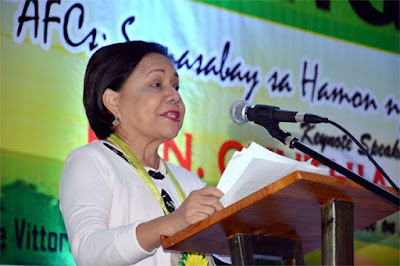 |
| Senator Panfilo “Ping” Lacson, Sr. addresses more than 70 participants from Regions 6,7 and 8 of the first-ever Visayas-wide AFC Congress last October 14, 2015 at Doher Hotel in Mandaue City, Cebu. Listening to the senator are PCAF Exec. Dir. Ariel Cayanan, RTD Marina Hermoso of DA-RFO7, Region 7 RAFC Chairperson Lou Cabalde, Region 8 Chairperson Edgardo Codilla and Region 6 Chairperson Ricardo Povido, Jr. |
“Those who provide most of the nation's food remain noticeably poor.”
This is a concern raised by former Senator Panfilo “Ping” Lacson, Sr. at the opening program of the first-ever Visayas-wide Agricultural and Fisheries Council (AFC) Congress last October 14 to 16, 2015 in Mandaue City in Cebu.
The three-day event aims to provide a proper venue for consultation on regional cross-cutting topics and serve as a support mechanism among AFCs in the Visayas region. The congress was a result of a cooperation with the Department of Agriculture-Regional Field Offices and the Regional AFC (RAFC) of Regions 6, 7 and 8.
Addressing more than 70 AFC officers from Regions 6, 7 and 8, the former Presidential Assistant for Rehabilitation and Recovery Czar emphasized that one of the reasons why farmers and fisherfolks were experiencing below poverty level is corruption. It is the biggest culprit and stumbling block in alleviating poverty, exemplifying the infamous Fertilizer Fund Scam and pork barrel scam that had once highlighted the department.
He lamented that despite performing well in 1960s and 1970s, the Philippine agriculture faltered in the succeeding years, resulting to sector’s decelerating growth compared to other Asian countries.
Undeterred by these challenges, Lacson remains positive with RAFC and lauded initiatives like the Visayas-wide Congress that serves as a vehicle for progress to the agriculture and fishery sector. He also appealed to the AFC officers to fight “tooth and nail” against fraudulent entities that oppress farmers and fisherfolks.
 |
| Some of the participants pose for a photo-op during the last day of the Visayas-wide AFC Congress. |
Secretary Fredelita Guiza, newly appointed secretary of the Office of the Presidential Assistance for Food Security and Agricultural Modernization (OPAFSAM), also challenged AFC officers to promote convergence for a closer coordination and linkages with the private sectors especially in the grass roots level.
“We, at OPAFSAM aim to strengthen and improve the lives of the farmers. This is why we are here to update you on the programs implemented by the National Irrigation Administration, Philippine Coconut Authority and the National Food Authority that will equip you in these challenges,” Sec. Guiza added.
On the other hand, to fulfill its duty in creating an avenue for development, RAFC Region 7 Chairman Lou Cabalde presented relevant topics that could promote preparedness during calamities and disasters, as well as competitiveness amidst financial crisis.
One of these topics is the role of AFC in livelihood recovery program. The discussion was led by Engr. Edwin Andot, RAFC Chairman of Region 10 who shared how the Ecosystem Worked for Essential Benefits (EcOWEB) have helped the municipalities of Guiuan, Salcedo and Mercedes in Eastern Samar build their livelihoods after the destruction caused by typhoon Yolanda.
Through the initiatives of RAFC officials in Eastern Samar in Region 8, the beneficiaries were able to produce 160 tons of pork per year from 60 households that have helped them recover their livelihood.
To address the topic of climate change, Engr. Oscar Tabada, Chief of Philippine Atmospheric, Geophysical and Astronomical Services Administration (PAGASA)- Visayas Regional Services, assured the participants that the agency is enhancing its observing systems and monitoring facilities for early warning system by upgrading surveillance radars and establishment of Doppler Radar. For the benefit of the farmers and fisherfolks, there are plans of enhancement and acquisitions of facilities that will produce accurate weather forecast and conclusive advisories.
Dr. Roehlano Briones, Research Fellow II of the Philippine Institute of Development Studies at National Economic and Development Authority (NEDA) also graced the congress and discussed the impact of the Association of Southeast Asian Nation (ASEAN) Economic Community Free Trade on agriculture and fishery sector.
Earlier reports raised doubts on the negative effects of reducing tariffs and other barriers which may cause unfair competition among other countries. However, Briones pointed out that with agreement, the Philippine agriculture will have an opportunity to gain access in the ASEAN regional market.
The challenges and opportunities in agriculture preparedness and competitiveness under the “new normal” were discussed by Dr. Esteban Godilano, consultant of DA Systems-Wide Climate Change Office. In his talk, Dr. Godilano introduced the Adaptation and Mitigation Initiatives in Agriculture (AMIA) to address climate change in agriculture and how it paved the way into achieving multi-hazard maps of every local government unit to conduct tactical and strategic plans for informed decision-making.
Lastly, Baltazar Tribulano, Jr., Chief of Cebu Provincial Disaster Risk Reduction Management Office shared his knowledge on how to heighten the participants’ competencies in disaster readiness and survival planning through relating it to simple home activities.
In spite of the challenges that the agriculture sector is facing, Philippine Council for Agriculture and Fisheries (PCAF) Executive Director Ariel Cayanan have expressed his admiration to all the private partners who have been a great help towards agricultural progress.
In his message, Dir. Cayanan mentioned that this is an excellent place to exchange ideas and formulate effective approach in different issues the sector is facing.
Also present in the congress were Mandaue City Councilor Jimmy Lumapas, Regional Technical Director Marina Hermoso of DA-RFO7, Region 8 RAFC Chairperson Edgardo Codilla and Region 6 RAFC Chairperson Ricardo Provido, Jr.























